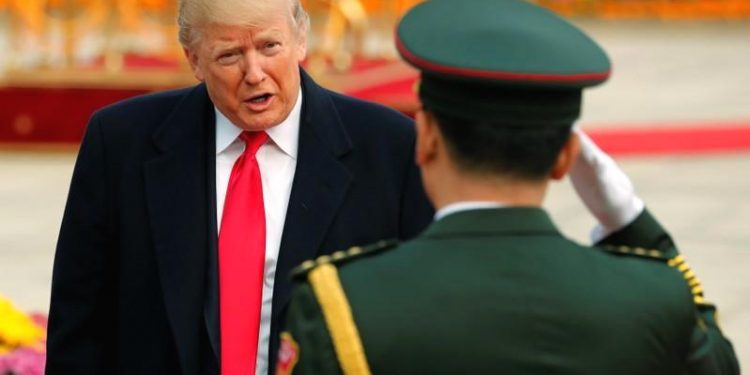HONG KONG: Donald Trump is kindling a trade war with China. Yet in parts of the country’s private sector, there is surprising, if discreet, support for the U.S. president.
For entrepreneurs and others who would like to see more open markets and competition in the People’s Republic, there’s an absence of domestic pressure on President Xi Jinping. Though their interests may not be served directly by most of Trump’s trade demands, his push for reform is pretty much the only game in town.
Outwardly, China’s officials, business people and state media present a united front opposed to what they dub American “protectionism.” In comments on the Chinese foreign ministry’s website late Monday, China’s top diplomat, State Councillor Wang Yi, denounced certain countries for “excusing protectionism and unilateralism,” a clear reference to Washington.
That message has been accompanied by intensified censorship of domestic reporting on economic issues in recent months, especially concerning trade with the United States. But beneath the surface a more complicated picture emerges.
Few Chinese private-sector executives or policy advisers see any benefit from higher U.S. import tariffs or tighter investment restrictions. Their counter-intuitive support for Trump stems instead from a sense that the impetus for market-friendly reforms has stalled, even for changes squarely consistent with “socialism with Chinese characteristics” – the adoption of elements of market economics within a communist framework dating back mostly to Deng Xiaoping’s time in power in the 1980s.
To such people, Xi appears largely uninterested in economic issues, preferring to focus on making the Chinese Communist Party great again, for example by enhancing the party’s control of state-owned enterprises and inserting its role into the articles of association of companies, including three dozen traded in Hong Kong. Senior officials in Beijing also seem unwilling to expend political capital to push through tough changes.
What’s more, government involvement in some areas, especially the consumer technology sector, has become noticeably more heavy-handed over the past year. In the second quarter, $342 billion gaming and social-media giant Tencent recorded its first year-on-year earnings decline since 2005 as the government implemented a freeze on new video game approvals and launched a crackdown on the industry, in part to combat myopia and addiction among children. Tencent has seen 40 percent of its market value, or some $240 billion, wiped out since January.
Meanwhile Zhang Yiming, the founder of one of China’s hottest new tech enterprises, Beijing ByteDance Technology, offered a public apology earlier this year after officials forced the company to suspend downloads of its most famous app, Toutiao, while another of the company’s smaller products was shut down altogether. Overall, it’s easy to see why many in China’s private sector are downbeat on the policy outlook.
As a result, reformers hope Trump may prove to be an external catalyst for change. If the U.S. president can move the Chinese leadership by wielding the blunt instrument of higher tariffs, the thinking goes, it might spur market openings that party officials would otherwise prefer to avoid. That in turn could help private companies to compete more effectively, especially with state-owned enterprises.
There’s logic to the argument: The few liberalizations that have been announced over the past year or so, such as plans to scrap joint-venture requirements for foreign carmakers and financial services providers, were responses to White House lobbying.
Xi and other top officials have in recent weeks also launched a charm offensive to revive flagging animal spirits among entrepreneurs, whose companies may be the best hope to provide jobs that a deleveraging state sector cannot. The Chinese president earlier this month pledged “unwavering support” to companies and entrepreneurs at a symposium on private enterprises in Beijing. He vowed to cut taxes, make it easier to get financing, and level the playing field with state-owned firms.
That sentiment has since been echoed by top officials such as Premier Li Keqiang as well as influential publications such as People’s Daily, which referred to private entrepreneurs as “one of our own.” It’s hard to know whether this is partly thanks to U.S. pressure or simply a recognition of the private sector’s importance to the economy. Either way, behind closed doors executives are pinning their reform hopes on Trump more so than on their own government.
REUTERS







































